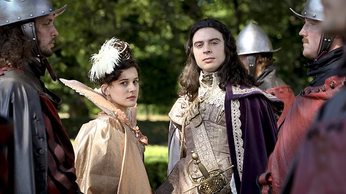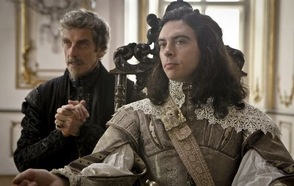
The Good Soldier, episode four of The Musketeers, might as well have been named “The One With All The Capes.” Capes were out in full force this week, swirling around the Cardinal as he did something particularly Machiavellian and smartening up the musketeers on parade. d’Artagnan still isn’t a musketeer, and so didn’t get a cape, but for some reason he was still on parade. It’s starting to feel like he’s the regiment mascot. After Athos' destructive trip to the past last episode, it was Aramis' turn to flashback to a psychologically traumatising incident. It was a lot less sunny and a lot more tinged with blue.

That’s not to say that this episode was a bad one. Rather than focussing on the character work from last episode, it was more of a political thriller with a sidenote of trauma and truth-seeking. Pushing the musketeers themselves slightly away from the plot meant that Cardinal Richelieu and Captain Treville got a chance to shine. Whether Richelieu was being sarcastic to the Duke of Savoy, placating the king or conspiring with Treville, his lines this week were astounding. And the double take he did at the disguised d’Artagnan was a masterpiece of comedic acting. In fact, all of Peter Capaldi’s reactions from this point on were wonderful, as his eyes widened in glee at the thought of getting away with his plan. And the inclusion of the wider political context meant that even though he did betray musketeers to their death, we can see the justification behind it. Captain Treville, up until this point, has just been a standard desk-slapping boss. Yes, he didn’t move much beyond this, but at least he got to be conflicted.
The lack of Milady meant that the thematic link of her appearing at the end of each episode ended. Also, Constance managed to get slightly more development beyond wearing an ill-fitting corset and scolding d’Artagnan. There was a callback to her killing in the first episode, one of the few references to past episodes we’ve had. And the sexual tension got ramped up between her and d’Artagnan, although whether he’ll insist upon her being a friend remains to be seen.

So, while this politically charged episode definitely suffered from clunky plotting and convenient characters, it did look good, and the characters that got to do anything generally did it well. Next time (in a fortnight, because it’s BAFTA time!), we get to see the Parisian underworld, which promises to be even grimier than most of the sets we’ve seen so far, and Porthos gets even more backstory as he ends up back on the streets of his youth. Aramis also looks like he’ll get into some kind of religious debate, leaning more towards his original characterisation of lady-loving priest.

 RSS Feed
RSS Feed
